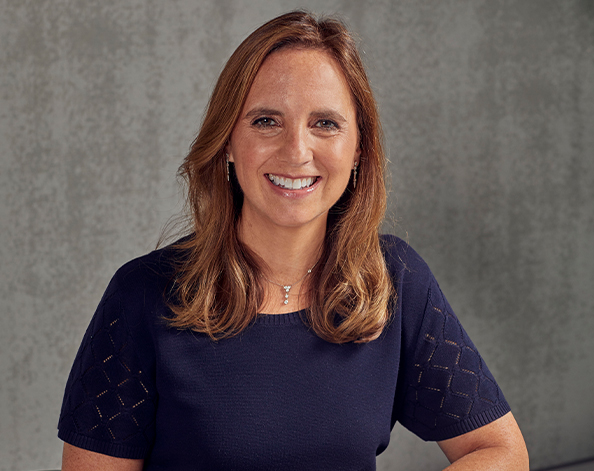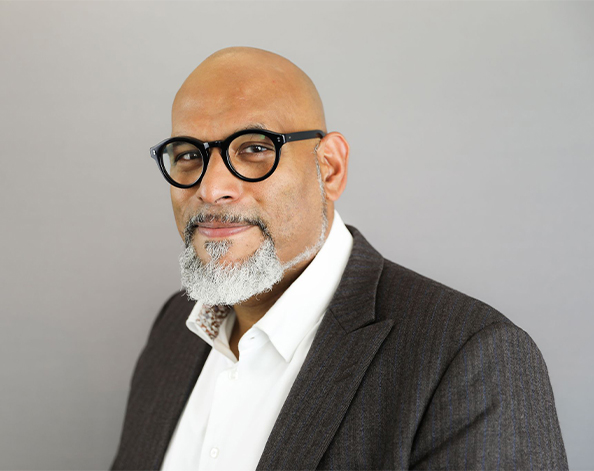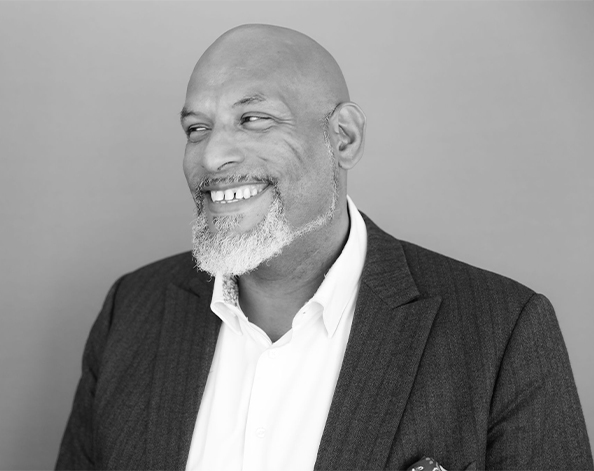John Amaechi used to believe his mother could perform magic.
As a young boy growing up in Stockport, he often accompanied his mum, a GP, when she visited patients in their home. He observed the way she interacted with family members of patients who were severely ill. When she left, a group of people who were in despair felt like they could cope for another week.
In time, John came to realise that the magic was an actual science: psychology.
"The idea that with your words you can change how somebody feels and that somebody is then more able to cope," he says. "That's what made me want to pursue psychology."
Today, John is an organisational psychologist, a Chartered Scientist, an OBE and the founder of APS Intelligence, a company that provides organisations with evidence-based solutions to a range of workplace challenges. He's also a former NBA basketball player.
According to John – and his company's extensive research – diversity, equity and inclusion are key to creating high-performing organisations. At Investec, we feel the same.
We work hard to foster an environment where there's a strong sense of belonging and people are comfortable celebrating their individuality. We want to create spaces where everyone can not only participate freely, but also grow and thrive.
But there is always more that organisations can do, including us.
That's why we were delighted that John could share some of his insights with Investec Bank plc’s CEO Ruth Leas for our latest Focus Talk, where they discussed belonging, diversity and inclusion in the workplace.
As John highlights, all three are crucial for a high-performance culture – diversity alone isn't enough.
"The presence of difference has never meant access to the brilliance of difference," he says.
So, what can organisations do to encourage more inclusive leadership and access the brilliance of difference? And how can diverse, high-performing teams help businesses seize new opportunities?
Below are five key talking points from John and Ruth's fascinating discussion.
Prefer to listen on the go?
Download or stream a podcast of the full discussion between Ruth Leas and John Amaechi.
1. Understand actions speak louder than words
John spoke about the power of words when talking about his mother's unerring knack for putting patients and their families at ease. Our words have the ability to comfort, console and support people during difficult times. But it’s important not to rely solely on words.
"Saying you care without any accompanying actions can be more damaging than saying nothing at all," he explains. "You have to demonstrate it."
A good example is when organisations say they are on a 'journey' with regards to diversity and inclusion.
For John, two factors define a journey: the destination and expedience. Organisations can't be on a journey if they don't have a good understanding of where they are going or a consensus on how quickly they will get there.
"[Diversity and inclusion] should be a journey, but it isn't yet. We have to make sure it is," he says. "Let's figure out how to get everybody on the same page.
"Who are the people that you're going to communicate with to let them know the urgency of this work? Let them know exactly what the destination looks like."
Leaders must also speak up when they see behaviour that goes against the organisation's values. John firmly believes that any culture is defined by the worst behaviour that people are willing to tolerate.
And it's not just obvious rule-breaking or abuse that needs to be called out. It's the subtle, sophisticated behaviours and microaggressions too, such as when someone steals a colleague's ideas and passes them off as their own.
"When even the smallest thing that doesn't fit with your values is allowed, it eliminates the values. It destroys them, it erodes them slowly," John says.
People should also be self-aware and recognise the impact their behaviour has on others. This is especially important for leaders because of the disproportionate power they hold.
"Everybody is a giant to somebody. And there's nothing more dangerous than a giant who doesn't know he's a giant," John comments.
2. Care about people
We live in an increasingly automated world, but John is confident the world of work will always fundamentally focus on people. The future is human.
"That means we can't just treat each other like widgets of productivity," John explains. "We have to give a damn about each other as people."
The Covid-19 pandemic has brought these issues into sharper focus over the last two years.

At Investec, we often talk about doing the right thing, even when no-one is looking. That's always been the ethos here, and there's always been a generosity of spirit. An investment bank with a heart and a soul.
"We have to care when somebody comes in after a night of caring responsibilities, that hasn't gone well, for example, with an older parent or sibling or child. We can't just have them come into work and pretend that's a normal day for them."
Making accommodations, investing in a person's development and – crucially – always being present and attentive when interacting with colleagues are all ways that inclusive leaders can show they care.
"Our attention is a tool or a weapon. We all know that when somebody is not paying attention to you, they are saying something about you," John adds.
"They might be saying you're boring. They might be saying what you're saying is not of value, but they are saying something negative about you when they don't pay attention."
3. Adapt how we work
Like many people at the beginning of the pandemic, John wasn't a fan of the transition to working virtually. At 6 foot 9 inches tall and weighing roughly 180kg, his personal presence certainly leaves a lasting impact on people.
"When I walk into a room, you may not like me, but you can't ignore me!" he says.
"One of my skills is being able to connect with people in person in a way that – although I don't know you yet – I care about what is happening in this interaction. I was worried about how this would translate [online]."
But John says we need to leave our excuses about the virtual world behind. It's still possible, albeit more challenging, to make people feel a sense of belonging and inclusion. To do so, we need to reimagine the workplace and create environments where people can thrive.
"There are colleagues who have been operating in really difficult environments. Junior colleagues perched on the end of a bed with a hot laptop on their knee," he says.
"We have to recognise that when the end of the pandemic comes, and it hasn't yet, there will be an opportunity for us to rethink how we work together."
What might that involve? An easy first step is to stop holding back-to-back meetings, just because it's more possible in a virtual world. People can't stay engaged and focused for seven-hour blocks without pause. They need time to breathe.
"And those colleagues who work 14-hour days for any period of time; we can't just pretend that's sustainable," John says.
4. Recognise that everyone has a responsibility
Inclusive leaders have a huge impact on fostering belonging, diversity and inclusion within an organisation. John likens the effect to a murmuration, when massive groups of starlings twist, turn, swoop and twirl in perfect formation across the sky.
"One of my colleagues did their doctoral dissertation on murmurations. They found that only four birds have to communicate for millions of birds to move in this agile way."
But while a few individuals in an organisation may be the driving force behind diversity, equity and inclusion, John says everyone should play their part. People need to understand that dignity is not a zero-sum game.

No man has to lose so that women get equality. No white person has to lose so that black people get equality. No person without a disability has to lose so that a disabled person can get equality.
"Dignity is one of the few things that when one person gives it to another, both parties get more."
So, what can people do to be more inclusive day to day? John recommends a combination of 'benign ignorance' and 'enthusiastic inquisitiveness' to make people feel welcome and included.
Benign ignorance means throwing out any stereotypical first impressions and committing to not making assumptions about someone new. Let them present their best foot to you.
Meanwhile, enthusiastic inquisitiveness is about making it clear to people that whatever they want to share with you about themselves, you will listen and treat them with the utmost respect.
"People want to share with you. They want to disclose. People find it easier to let you know who they are. And once they do, you can start building that relationship. That builds teams. That builds high performance," John says.

There are people who think that we can solve inequality by pretending that everyone's the same. They're not at all. And it is their differences that bring richness that allows us different perspectives and makes us more resilient during times of change.
5. Look beyond traditional indicators of performance
Inclusive leaders are instrumental in building a high-performance culture, but what qualities should they be looking for in their teams?
According to John, many of the traditionally favoured metrics, such as years of experience or personality tests, are generally poor at predicting future performance. In fact, he cites one study that showed graphology – a person's handwriting – is about as accurate as their number of years' experience for predicting performance.
"I tend to look for energy in the face of the mundane, the vexing or the obscure. Colleagues who approach stuff that is boring or dull with real energy," John says.
"People who are scientifically minded. And by that, I mean people who allow evidence to change their mind. I know we're in this weird world where changing your mind is a bad thing, but I think it's really important."
Accountability is also sexy, he says. Indeed, he has a T-shirt that says exactly that. It shows someone is willing to take responsibility for something, even if they may need support and guidance along the way.
Ultimately, John believes inclusive leaders must face the fact that the way organisations recruit people and the preconceptions they have about what talent looks like is often based on familiarity and similarity.
"It's as much based on personal comfort – whether I would feel comfortable working with someone, whether I have to learn new things to work with a person who is different – versus whether they're actually good," he says.
"I know people are very interested in winning. I want to win. But it's not just about that; I look at my life and the richness offered to me by the weird and wonderful collection of people I know. It's amazing. Everybody could have that."

I bank with Investec for a reason. I moved from somewhere else. That's what happens when you find people who act congruently with the values that really resonate. People will vote with their feet. I voted with my feet.



